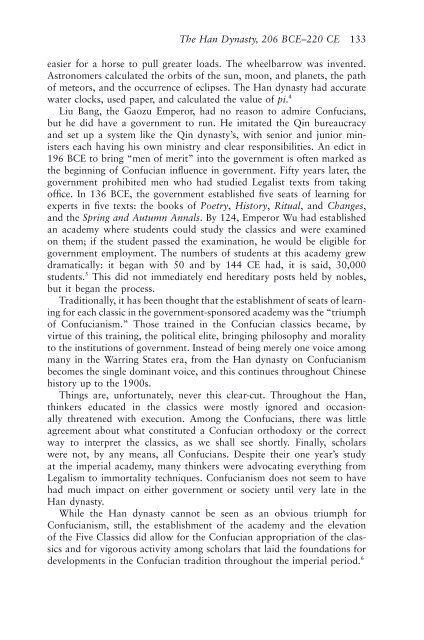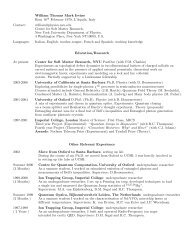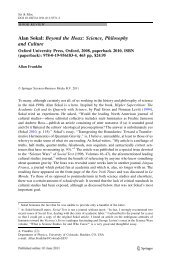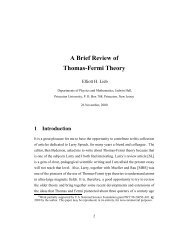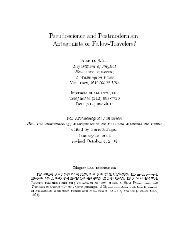Good Confucianism book (pdf) - Department of Physics
Good Confucianism book (pdf) - Department of Physics
Good Confucianism book (pdf) - Department of Physics
Create successful ePaper yourself
Turn your PDF publications into a flip-book with our unique Google optimized e-Paper software.
The Han Dynasty, 206 BCE–220 CE 133easier for a horse to pull greater loads. The wheelbarrow was invented.Astronomers calculated the orbits <strong>of</strong> the sun, moon, and planets, the path<strong>of</strong> meteors, and the occurrence <strong>of</strong> eclipses. The Han dynasty had accuratewater clocks, used paper, and calculated the value <strong>of</strong> pi . 4Liu Bang, the Gaozu Emperor, had no reason to admire Confucians,but he did have a government to run. He imitated the Qin bureaucracyand set up a system like the Qin dynasty ’ s, with senior and junior ministerseach having his own ministry and clear responsibilities. An edict in196 BCE to bring “ men <strong>of</strong> merit ” into the government is <strong>of</strong>ten marked asthe beginning <strong>of</strong> Confucian influence in government. Fifty years later, thegovernment prohibited men who had studied Legalist texts from taking<strong>of</strong>fice. In 136 BCE, the government established five seats <strong>of</strong> learning forexperts in five texts: the <strong>book</strong>s <strong>of</strong> Poetry , History , Ritual , and Changes ,and the Spring and Autumn Annals . By 124, Emperor Wu had establishedan academy where students could study the classics and were examinedon them; if the student passed the examination, he would be eligible forgovernment employment. The numbers <strong>of</strong> students at this academy grewdramatically: it began with 50 and by 144 CE had, it is said, 30,000students. 5 This did not immediately end hereditary posts held by nobles,but it began the process.Traditionally, it has been thought that the establishment <strong>of</strong> seats <strong>of</strong> learningfor each classic in the government - sponsored academy was the “ triumph<strong>of</strong> <strong>Confucianism</strong>. ” Those trained in the Confucian classics became, byvirtue <strong>of</strong> this training, the political elite, bringing philosophy and moralityto the institutions <strong>of</strong> government. Instead <strong>of</strong> being merely one voice amongmany in the Warring States era, from the Han dynasty on <strong>Confucianism</strong>becomes the single dominant voice, and this continues throughout Chinesehistory up to the 1900s.Things are, unfortunately, never this clear - cut. Throughout the Han,thinkers educated in the classics were mostly ignored and occasionallythreatened with execution. Among the Confucians, there was littleagreement about what constituted a Confucian orthodoxy or the correctway to interpret the classics, as we shall see shortly. Finally, scholarswere not, by any means, all Confucians. Despite their one year ’ s studyat the imperial academy, many thinkers were advocating everything fromLegalism to immortality techniques. <strong>Confucianism</strong> does not seem to havehad much impact on either government or society until very late in theHan dynasty.While the Han dynasty cannot be seen as an obvious triumph for<strong>Confucianism</strong>, still, the establishment <strong>of</strong> the academy and the elevation<strong>of</strong> the Five Classics did allow for the Confucian appropriation <strong>of</strong> the classicsand for vigorous activity among scholars that laid the foundations fordevelopments in the Confucian tradition throughout the imperial period. 6


